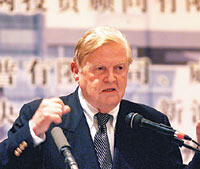No grounds to revalue yuan, experts declare
( 2003-09-15 07:22) (China Daily)
International pressure to revalue the yuan is becoming an issue more of political concerns than economic significance, according to several top economists who contend that China should maintain the current exchange rate for its currency.

Robert Mundell: Stick to policy |
Robert Mundell, the 1999 Nobel laureate in economics, said over the weekend: "There's never before in history (been a situation) that international monetary authorities ... try to pressure a country with an inconvertible currency to appreciate its currency."
Mundell was speaking to a forum at the Sixth China Beijing International High-tech Expo.
The Columbia University professor said that China should not appreciate or devalue the renminbi in the foreseeable future.
"Appreciation or floating of the renminbi would involve a major change in China's international monetary policy and have important consequences for growth and stability in China and the stability of Asia," Mundell said.
Experts at the forum shared Mundell's view that there is no convincing evidence that China should alter its yuan policy at the moment.
Fred Hu, managing director of Goldman Sachs (Asia), told the forum that the yuan is not central in tackling the main problems facing the world economy today.
According to Hu, China's economy, despite its rapid growth, accounts for a meagre 3.5 per cent of the global gross domestic product (GDP). Even the remarkable annual foreign direct investment (FDI) inflows to China are not determined by an "excessively undervalued" currency as some people suspect, but rather by the country's attractive domestic market and growth fundamentals, Hu said.
Experts said that China's trade surplus, a key target in the criticism of the yuan policy, has actually little direct link with the exchange rate.
"China's recent export performance has been truly spectacular, but it is primarily driven by the country's decade-long trade reforms, dynamic private enterprises, abundance of cheap labour and most importantly, multinational companies' growing processing and assembly operations in China," said Hu.
The country's exports have consistently performed well throughout the highs and lows of the yuan, according to experts at the conference. They added that the export boom has continued even during the turbulent years of Asia's financial crisis, when, ironically, there was pressure for the yuan to be devalued.
Zhu Min, a senior adviser to Bank of China, said that the pressure for the yuan to appreciate does exist, mostly because short-term speculative "hot money" of some US$20-30 billion sneaked into China in the first half of the year as speculators bet on the yuan's sharp appreciation.
"But we should definitely not follow the trend of hot money. This is a hard-learned lesson from the Asian financial crisis," Zhu said.
IMF won't pressure China
The managing director of the International Monetary Fund (IMF) has said that the institution will not exert pressure on China over its foreign-exchange policy.
Speaking to reporters at the IMF's headquarters in Washington on Friday (local time), Horst Kohler said he does not think the IMF should be part of a scenario of pressuring China to take decisions when it is not convinced it is in its best interests.
But taking steps towards more flexibility in China's foreign-exchange rates is appropriate, he said, adding that he does not want to speculate about the timetable for these moves and would prefer discussions in a specific context.
Kohler said people should not forget the contributions of China during the Asian crisis, when it was widely praised for not devaluing its currency; thus greatly helping stabilize the international financial markets at that critical time.
Kohler talked about the importance of being fully aware of the major risks related to moving to a more flexible exchange-rate system and ensuring the maturity of the financial sector beforehand.
Kohler also said that China is in a period of strong growth and that the country's further integration into the world economy is in the interests of all involved.
He called for more co-operation between all parties concerned to address the issue, hoping that the international community and China would find a solution together.
|

